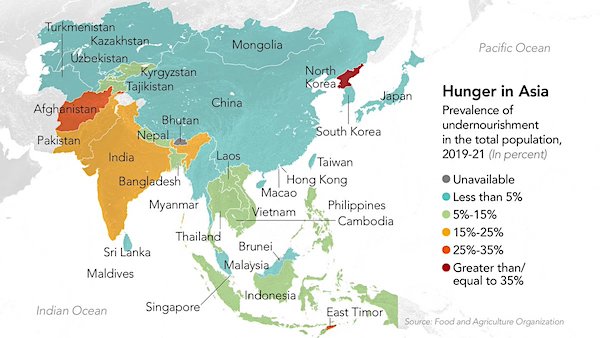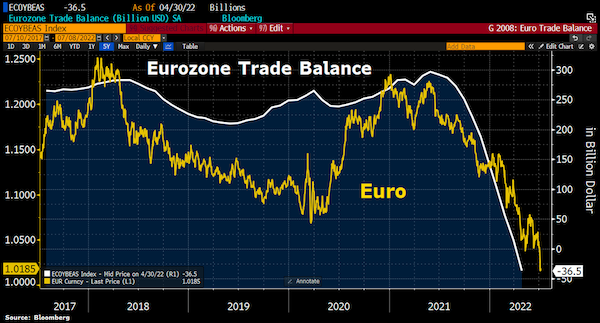
Odilon Redon The Birth of Venus II c.1910





1.3% of 3% of 0.04%
Inconvenient truth.pic.twitter.com/xKiaDebWG7
— James Melville (@JamesMelville) July 9, 2022



When I was young, I was poor.
After years of hard, honest and back breaking work, I am no longer young.


“..the ‘west’ can no longer produce enough new weapons and ammunition to cover those losses.”
• ‘Drinking The Kool-Aid’ On The War In Ukraine (MoA)
The war in Ukraine is a ‘special military operation’ and very untypical for several reasons. Russia attacked with a force that was smaller than the Ukrainian forces. Over all roughly 120 Battalion Tactical Groups (BTG) from Russia with 1,000 men each plus some 50,000 soldiers from the Luhansk and Donetzk republics took part in the war. At the begin of the war the Ukrainian forces had 250,000 soldiers and they have since mobilized several hundred thousand more. Russia uses far more sophisticated weapons than the Ukrainian side. These are long range weapon and cruise missiles that hit supplies and incoming troops in the rear of the frontline as well as strategic targets. It has an excellent and nearly impenetrable air defense and electronic war fare capabilities that a high ranking U.S. officer described as ‘eye watering’.
Russia has a huge advantage in artillery capabilities and a sufficient amounts of ammunition to sustain a high rate of fire over years. It can also outproduce the ‘west’ with regards to new weapons and supplies. All this has led to the very unusual effect that the Russian advantage on the battlefield has increased over time. It may have been 1 to 1 at the beginning of the battle but it has since increased to about 2 to 1 or even higher. In his latest briefing the head of the Austrian military academy Colonel Reisner shows how the ratio of forces has changed over time. At 7:10 min in he shows this chart.

He explains that at the beginning of the battle for Donbas in April the force ratio was 93 Russian BTGs against 81 Ukrainian BTG equivalents. On June 26 the ratio of forces was 108 Russian BTGs versus 60 Ukrainian battalion equivalents. Russia had increased the size of its engaged forces while the Ukrainian side had lost 25% of its capabilities. So according to the Austrian military the force ratio at the start of the ‘special military operation’ was 1.15 to 1 and on June 26 it was at 1.8 to 1. What we are seeing is the opposite of the decrease of the ratio of forces that Clausewitz described as the path to the culminating point. A recent talk by a high ranking Ukrainian general confirms the high rate of attrition of the Ukrainian army. He says that ‘western’ weapon deliveries only cover 10 to 15% of the Ukrainian losses. In fact the ‘west’ can no longer produce enough new weapons and ammunition to cover those losses.

Ukraine prefers to let Germany freeze.
• Canada Exempts Russian Gas Turbine From Sanctions (G.)
Canada will return a repaired Russian turbine to Germany that it needs for the Nord Stream 1 gas pipeline, despite objections from Ukraine, as the sanctions regime came up against the energy crisis sparked by the war. Canada’s minister of natural resources, Jonathan Wilkinson, said in a statement on Saturday the government was issuing a “time-limited and revocable permit” to exempt the return of turbines from its Russian sanctions, to support “Europe’s ability to access reliable and affordable energy as they continue to transition away from Russian oil and gas”. Wilkinson said the export permit was issued after discussions with “our European friends and allies”, and the International Energy Agency.
Russia’s Gazprom cut capacity on the Nord Stream 1 pipeline from Russia to Europe to just 40% of usual levels last month, citing the delayed return of equipment being serviced by Germany’s Siemens Energy in Canada. The Kremlin said on Friday it would increase gas supplies to Europe if the turbine were returned. The part is required for maintenance work due to start on Monday. Canada – which has been under pressure from Germany to find a way to return the turbine – said “absent a necessary supply of natural gas, the German economy will suffer very significant hardship and Germans themselves will be at risk of being unable to heat their homes as winter approaches”.
Alexandra Chyczij, national president of the Ukrainian Canadian Congress, said on Saturday “our community is deeply disappointed by the Canadian government’s decision to bow to Russian blackmail”. The group said Canada was setting “a dangerous precedent that will lead to the weakening of the sanctions regime imposed on Russia”. Canada has one of the world’s biggest Ukrainian diasporas outside of countries that border Ukraine and has urged the prime minister, Justin Trudeau, to refuse to compromise the country’s sanctions against Russia over the turbine issue. Ukraine has opposed Canada handing over the turbine and Kyiv believes such a move would flout sanctions on Russia, a Ukrainian energy ministry source told Reuters on Thursday.

Dutch farmers have promised an “involuntary lockdown” of the country tomorrow.
• A Popular Uprising Against the Elites Has Gone Global (Schoelhammer)
Over 30,000 Dutch farmers have risen in protest against the government in the wake of new nitrogen limits that require farmers to radically curb their nitrogen emissions by up to 70 percent in the next eight years. It would require farmers to use less fertilizer and even to reduce the number of their livestock. While large farming companies have the means to hypothetically meet these goals and can switch to non-nitrogen-based fertilizers, it is impossible for smaller, often family-owned farms. The new environmental regulations are so extreme that they would force many to shutter, including people whose families have been farming for three or four generations. In protest, farmers have been blockading streets and refusing to deliver their products to supermarket chains. It’s been leading to serious shortages of eggs and milk, among other food items.
But the effects will be global. The Netherlands is the world’s second largest agricultural exporter after the United States, making the country of barely 17 million inhabitants a food superpower. Given global food shortages and rising prices, the role of Dutch farmers in the global food chain has never been more important. But if you thought the Dutch government was going to take that into account and ensure that people can put food on the table, you would be wrong; when offered the choice between food security and acting against “climate change,” the Dutch government decided to pursue the latter. What is particularly frustrating is that the government is fully aware that what it is asking farmers to do will drive many of them out of existence. In fact, the government originally planned to move at a slower pace—until a lawsuit brought by environmental groups in 2019 forced an acceleration of the timetable.
Farmers kids
https://twitter.com/i/status/1545809018500878338
The reaction by members of the agricultural sector has been massive and ongoing since 2019, but the onset of the COVID-19 pandemic allowed the government of Prime Minister Mark Rutte to ban protests in 2020 and 2021. With the reignited demonstrations this year, the authorities have also switched to a more aggressive approach. There have been arrests and even warning shots fired by police at farmers, one almost killing a 16-year-old protestor. But while the Dutch people are on the side of the farmers, their elites are behaving much as they did in Canada and the U.S., and not just those in government. Media outlets are refusing to even report the protests, and when they do, they cast the farmers as extremists. Why the disconnect?
Every reliable poll of European newsrooms from Germany to the Netherlands show that climate change is a much more important topic for journalists than it is for ordinary people. It’s not that average citizens don’t care about climate change, but that they have the common sense to know that destroying their farm so the government’s emission goals can be met in 2030 instead of 2035 will not change the planet’s climate. After all, the Netherlands accounts for just 0.46 percent of the world’s CO2 emissions, and while a further reduction might be desirable, it will not be decisive in combating climate change over the next eight years. It may make the country’s elite to feel good about themselves, but it will also result in large parts of the population seeing their living standards decline and their economic existence targeted by the state for ideological reasons.
Albania
nationwide protests.
The government collapsed the economy, they’ve been told to resign.
— The Daily Sneed™ (@Tr00peRR) July 9, 2022

A color revolution?
• Sri Lanka President Agrees To Resign Amid Unrest (O.)
The Sri Lankan president, Gotabaya Rajapaksa, has agreed to resign after a dramatic day during which his house and offices were stormed by protesters and the home of the prime minister set on fire. In a late-night message conveyed through the parliamentary speaker, Mahinda Yapa, the beleaguered president said he would step down from power on 13 July to “ensure a peaceful transition of power”. It was an historic victory for the protesters who have been calling for him to resign for months and gathered on the streets of Colombo in their tens of thousands on Saturday, as the country continues to struggle through its worst economic crisis since independence. Earlier prime minister, Ranil Wickremesinghe, had told a meeting of party leaders that he too would resign as soon as a new all-party government was formed.
In extraordinary scenes on Saturday, protesters broke through police barriers and charged into the president’s official residence. Images and witness accounts showed people flooding up the grand staircase of the colonial-era building, with chants calling for the president to go. As protesters poured into the bedrooms and kitchen and rifled through the president’s possessions, many took full advantage of the president’s luxury amenities which had been denied to them in recent weeks due to rampant food and fuel shortages. Protesters were seen cooking up curries in the kitchen, lying down on beds and sofas, lifting weights and jogging in his private gym and jumping into the outdoor pool. The president was not at home, having fled the night before under military protection, and he remained in hiding as Saturday’s events unfolded.
[..] Sri Lanka is continuing to struggle through a devastating crisis in which the economy has completely collapsed and the government is unable to afford to import food, fuel and medicines. All sales of petrol have been suspended, schools have shut and medical procedures and surgeries are being delayed or cancelled over a shortage of drugs and equipment, with the UN recently warning that the country is facing a humanitarian crisis. Inflation is a record-breaking 54.6% and food prices have gone up fivefold, meaning two-thirds of the country are struggling to feed themselves. Sri Lanka defaulted on its foreign debts in May, which total over $51bn, and is in negotiations with the IMF for a $3bn bailout.

A testing ground?
• Green Dogma Behind Fall Of Sri Lanka (Shellenberger)
Sri Lanka has fallen. Protesters breached the official residences of Sri Lanka’s Prime Minister and President, who have fled to undisclosed locations out of fear of death. The proximate reason is that the nation is bankrupt, suffering its worst financial crisis in decades. Millions are struggling to purchase food, medicine and fuel. Energy shortages and inflation were major factors behind the crisis. Inflation in June in Sri Lanka was over 50%. Food prices rose by 80%. And a half-million people fell into poverty over the last year. But the underlying reason for the fall of Sri Lanka is that its leaders fell under the spell of Western green elites peddling organic agriculture and “ESG,” which refers to investments made following supposedly higher Environmental, Social, and Governance criteria.
Sri Lanka has a near-perfect ESG score (98) which is higher than Sweden (96) or the United States (51), notes a commentator. To be sure, there were other factors behind Sri Lanka’s fall. COVID-19 lockdowns and a 2019 bombing hurt tourism, a $3 billion to 5 billion-per-year industry. Sri Lanka’s leaders insisted on paying China back for various “Belt and Road” infrastructure projects when other nations refused to do so. And higher oil prices meant transportation prices rose 128% since May. But the biggest and main problem causing Sri Lanka’s fall was its ban on chemical fertilizers in April 2021. Over 90% of Sri Lanka’s farmers had used chemical fertilizers and, after the ban, 85% experienced crop losses. After the fertilizer ban, rice production fell 20% and prices skyrocketed 50 percent in just six months.
Sri Lanka had to import $450 million worth of rice despite having been self-sufficient in the grain just months earlier. The price of carrots and tomatoes rose five-fold. Tea, the nation’s main export, also suffered, thereby undermining the nation’s foreign currency and ability to purchase products from abroad. While there are 2 million farmers in Sri Lanka, 70% of the nation’s 22 million people are directly or indirectly dependent on farming. “We are furious!” said one rice farmer in May. “Angry! Not just me – but all the farmers who cultivated here are angry.” In November 2021, Sri Lanka tried to reverse course, but it was too late. Rajapaksa said, “we don’t have enough chemical fertilizers in the country because we didn’t import them. There is a shortage.” By the end of last August, President Gotabaya Rajapaksa had declared a state of emergency.

Because he missed by one inch?
• Police Chief: Officer Who Shot The Tractor Made A Wrong Assessment (NOS)
The officer who opened fire on a tractor during a farmers’ protest in Heerenveen feared for the safety of his colleagues. The highest police chief of the Northern Netherlands says this in an interview with NRC.Chief Commissioner Gery Veldhuis calls it a wrong assessment. The officer feared that the tractor would run into colleagues and therefore opened fire. The 16-year-old driver was arrested shortly afterwards on suspicion of attempted manslaughter, but an investigation by the Public Prosecution Service revealed that this was not the case. The National Bureau of Investigation is still investigating the incident. That is why Veldhuis was unable to elaborate on what exactly happened.
“But he told me he shot because he was concerned for the safety of the employees he was performing with.” According to Veldhuis, the man is “through it”. “He thinks it is terrible that he ended up in a situation in which he thought he had to use his firearm. He also did not know that it was a 16-year-old boy.” Veldhuis would have thought it “rather dramatic” if the shot had been hit. It was previously reported that an officer went into hiding for his own safety after photos of him were distributed. Veldhuis confirms that the man is being threatened. He considers it difficult for his colleagues that they have to act against people from their own community during farmer protests.
At the same time, he warns that the police will try to confiscate tractors more often. “As long as farmers use their tractors for things other than what they are intended for, they should feel that they also lose their company resources as a result.” The family of the boy who was shot is still considering filing a complaint against the police. Driver Jouke Hospes said earlier that he was just driving away from the protest at the time of the shooting. According to Veldhuis, the police will pay for the damage to his window.

Where will the euro go tomorrow? Parity with the USD looms.
• Germany Is Quietly Shutting Down As Energy Crunch Paralyzes Economy (ZH)
Earlier today we wrote that Germany’s largest landlord, Vonovia, had taken the unprecedented step of restrictring heating at night, a terrifying preview of what lies in stock for the “most advanced” European nation this winter. Alas, it’s going to get worse, much worse. According to the FT, Germany is now rationing hot water, dimming its street lights and shutting down swimming pools as the impact of its energy crunch begins to spread like the proverbial Ice-Nine wave, from industry to offices, leisure centers and residential homes. The reason behind Germany’s slow motion paralysis is well-known: the huge increase in gas prices triggered by Russia’s move last month to sharply reduce supplies to Germany has plunged Europe’s biggest economy into its worst energy crisis since the oil price shock of 1973.
With electricity prices hitting never before seen levels, gas importers and utilities are fighting for survival while consumer bills are going through the roof, with some warning of rising friction (not to mention the infamous wheelbarrows full of cash). “The situation is more than dramatic,” said Axel Gedaschko, head of the federation of German housing enterprises GdW. “Germany’s social peace is in great danger.” Unfortunately, as tensions over Russia’s war in Ukraine escalate, officials fear the situation could get worse. On Monday, as we reported last week, Russia is shutting down its main pipeline to Germany, Nord Stream 1, for 10 days of scheduled maintenance. Many in Berlin fear it will never reopen.
Commenting on the infamous July 22 day when Russian gas flows are expected to resume, DB’s Jim Reid writes that “while we all spend most of our market time thinking about the Fed and a recession, I suspect what happens to Russian gas in H2 is potentially an even bigger story. Of course by July 22nd parts may have be found and the supply might start to normalise. Anyone who tells you they know what is going to happen here is guessing but as minimum it should be a huge focal point for everyone in markets.” The bank also conveniently warns that “if the gas shutoff is not resolved in coming weeks this would lead to a broadening out of energy disruption with material upfront effects on economic growth, and of course much higher inflation.”


“..The federal government authorized more than 300,000 loans to real estate entities claiming just one employee..”
• Real Estate Agents Got Billions In Covid Relief Loans. Few Repaid Them (NBC)
While Covid was battering the U.S. economy, Gary Goldberg seems to have done OK. During 2020, the pandemic’s first year, the Santa Barbara, California, real estate agent sold more than $27 million worth of luxury homes, slightly down from the $31 million he closed the year before, according to data from Zillow. In 2021, he sold $82 million worth of real estate. He also applied for and received two loans totaling $95,832 via the federal government’s Covid relief Paycheck Protection Program, according to public records. In his applications, he listed one employee. He asked for the first loan on April 15, 2020, and the second on Jan. 30, 2021. Federal records show he also asked for and received forgiveness for both loans by November 2021, meaning he had met certain criteria and did not have to pay them back.
In the United States, the average gross commission for real estate sales is 2.5 percent of the sale price, and the agent usually gets 85 percent of that, according to Real Trends Consulting, a firm that tracks home sales and commissions. According to that formula, Goldberg may have earned six figures in 2020 and seven figures in 2021. There’s no indication Goldberg did anything illegal and he’s certainly not alone. As real estate sales — and commissions — rose during the pandemic, individual agents also got a helping hand from taxpayers.
The federal government authorized more than 300,000 loans to real estate entities claiming just one employee, adding up to $3.9 billion in Paycheck Protection Program (PPP) loans backed by the U.S. Small Business Administration, according to data from the government’s Pandemic Response Accountability Committee (PRAC), which oversees pandemic relief spending. On average these real estate businesses got $13,000, but 146 entities got more than $90,000 each, according to the PRAC data, all of which is public record. PPP loans went to real estate agents in booming markets — $3.6 million to real estate entities in Beverly Hills, $4.3 million to entities in El Paso, Texas, and $14.9 million in 1,107 loans to real estate entities in Charlotte, North Carolina.


More background.
“It appears that Twitter Inc did not want to reveal how Jack’s Magic Coffee Shop was able to sustain operations..”
• Elon Musk Terminates Twitter Deal, Citing Material Breach of Agreement (CTH)
Elon Musk has notified Twitter and the SEC that he is exercising his “right to terminate the merger agreement and abandon the transaction contemplated” due to the social media company not providing transparent access to background data that would allow authentication of “monetized daily active users” (mDAUs). It appears that Twitter Inc did not want to reveal how Jack’s Magic Coffee Shop was able to sustain operations, at an extremely high cost, without making money. That’s the essential source of the issue. The social media company did not want anyone looking at the data stream inside the communication platform. Musk was not allowed to authenticate the number of real users and identify the number of ‘spam’ or ‘bot’ accounts within the platform.
From the SEC Letter: […] ” Specifically, in the Merger Agreement, Twitter represented that no documents that Twitter filed with the U.S. Securities and Exchange Commission since January 1, 2022, included any “untrue statement of a material fact” (Section 4.6(a)). Twitter has repeatedly made statements in such filings regarding the portion of its mDAUs that are false or spam, including statements that: “We have performed an internal review of a sample of accounts and estimate that the average of false or spam accounts during the first quarter of 2022 represented fewer than 5% of our mDAU during the quarter,” and “After we determine an account is spam, malicious automation, or fake, we stop counting it in our mDAU, or other related metrics.”
Mr. Musk relied on this representation in the Merger Agreement (and Twitter’s numerous public statements regarding false and spam accounts in its publicly filed SEC documents) when agreeing to enter into the Merger Agreement. Mr. Musk has the right to seek rescission of the Merger Agreement in the event these material representations are determined to be false. Although Twitter has not yet provided complete information to Mr. Musk that would enable him to do a complete and comprehensive review of spam and fake accounts on Twitter’s platform, he has been able to partially and preliminarily analyze the accuracy of Twitter’s disclosure regarding its mDAU. While this analysis remains ongoing, all indications suggest that several of Twitter’s public disclosures regarding its mDAUs are either false or materially misleading.
First, although Twitter has consistently represented in securities filings that “fewer than 5%” of its mDAU are false or spam accounts, based on the information provided by Twitter to date, it appears that Twitter is dramatically understating the proportion of spam and false accounts represented in its mDAU count. Preliminary analysis by Mr. Musk’s advisors of the information provided by Twitter to date causes Mr. Musk to strongly believe that the proportion of false and spam accounts included in the reported mDAU count is wildly higher than 5%.
Second, Twitter’s disclosure that it ceases to count fake or spam users in its mDAU when it determines that those users are fake appears to be false. Instead, we understand, based on Twitter’s representations during a June 30, 2022 call with us, that Twitter includes accounts that have been suspended—and thus are known to be fake or spam—in its quarterly mDAU count even when it is aware that the suspended accounts were included in mDAU for that quarter.”
Musk termites
"Twitter has been claiming < 5% fake/spam accounts, but, it is 4-5x that number. It's big deal. It's like, I agree to buy your house, you say the house has less than 5% termites but if it turns out it's 90% termites. It's not the same house" — @elonmusk pic.twitter.com/fbLMXkHMIN
— Pranay Pathole (@PPathole) July 9, 2022

“The main job of a minister these days is to keep his or her face off the front page..”
• The Rot In Canada’s Dysfunctional Government Is Coming From The Head (NP)
At the outset of the pandemic, a small army of unsung public servants was overwhelmed by a Niagara of employment insurance applications, as one-quarter of the Canadian workforce found itself out of work. Through a combination of ingenuity and dedication, they processed more than two million claims in three weeks and got money into the hands of the people who needed it. Yet, just two years later, the entire bureaucracy seems afflicted by an inefficiency that has led to a breakdown in the delivery of the most basic government services, from passports to immigration visas; from airport security to facilitating the flow of travellers across Canada’s borders.
Last week, a number of departments received a priority request from the government’s central agency, the Privy Council Office, to urgently review passport, immigration and airport service problems. One person who received it said there was more than a faint whiff of panic about the all-points bulletin. What can account for a plight that one senior bureaucrat compared to a body rotting from the inside? Few in official Ottawa have any doubts that the malady can be traced back to a Liberal government in its third term that no longer has the vitality it once possessed. Over the past seven years, the Liberals have lost, or jettisoned, some of their most seasoned ministers and political staffers.
They have often been replaced by farm-team players with less experience and less rounded skill sets. The upshot is a preoccupation with issues management and the politics of spin. The main job of a minister these days is to keep his or her face off the front page. In the mind of Victorian intellectual Walter Bagehot, the cabinet is the buckle which fastens the executive to the legislature. But in this government, at this time, ministers report not to Parliament but to the issues management department in the Prime Minister’s Office.

“..if Julian goes to the United States, and is effectively dropped in a penal hell hole, that will be the end of him literally, he will die..”
• Julian Assange ‘Will Die’ If Extradited To US – John Pilger (SCMP)
WikiLeaks founder Julian Assange, already ailing following a decade-long struggle for freedom, faces almost certain death if he is sent to a “penal hell hole” upon extradition to the United States, one of his staunchest supporters has said. John Pilger, the award-winning Australian filmmaker and journalist who has been a close confidante of Assange since 2010, said defeat for the 51-year-old in his battle in British courts against extradition could have far-reaching consequences for journalism. “I don’t think there is any doubt in my mind… that if Julian goes to the United States, and is effectively dropped in a penal hell hole, that will be the end of him literally, he will die,” Pilger said in an interview on Talking Post with chief news editor Yonden Lhatoo.
Pilger said Assange’s treatment over the years – he has been in London’s high-security Belmarsh prison since 2019 – was “torture”, adding that for the Australian national “anything” would be better than being sent to the US. Prior to his incarceration, Assange obtained asylum from Ecuador in 2012 and spent seven years in Quito’s embassy in London as part of efforts to avoid extradition to Sweden where he was facing charges of sexual assault. He denies all wrongdoing. Washington is seeking his extradition over charges of espionage and computer misuse linked to WikiLeaks’ publication of classified US documents since 2010. Assange’s supporters say the charges are politically motivated and that he would be unable to get a fair trial in the US.
“If Julian is extradited to the United States, I think it will effectively end real, independent investigative journalism,” Pilger said. “Who will take that risk again, if the United States and other countries … can reach anywhere in the world and take a journalist for writing something or revealing something it doesn’t approve of?” Asked if he believed Australia’s new Prime Minister Anthony Albanese would intervene to stop the extradition, Pilger said it remained to be seen if the new Labor administration believed Assange was innocent. Albanese is a signatory of the “Bring Julian Assange Home” campaign and was reported to have said in a party meeting last year that he believed the journalist should be freed. “Enough is enough,” Albanese was quoted as saying by Australian media.
“I don’t have sympathy for many of his actions, but essentially I can’t see what is served by keeping him incarcerated,” he reportedly said. But Pilger said whether Albanese would back Assange depended on Canberra’s overall US policy. “Will Australia deviate from the United States? My view is no,” Pilger said. Albanese’s remarks last year also did not underscore the fact that Assange “has committed no crime”, Pilger said.







Ali
https://twitter.com/i/status/1545362039480221698

2 kinds of dogs
there are two kinds of dogs
(jukin media) pic.twitter.com/6wkg1zaKYu— theworldofdog (@theworldofdog) July 7, 2022

Support the Automatic Earth in virustime with Paypal, Bitcoin and Patreon.








